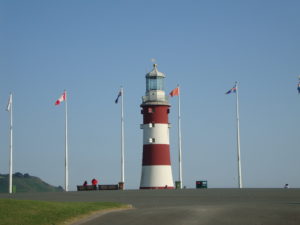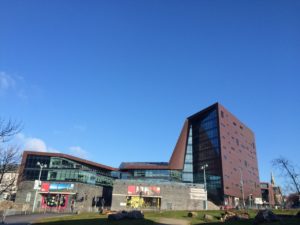Training seminar for teachers
“Using Digital Literacy and Film Making To Enhance Learning Experiences”
In the framework of the 4th edition of the Festival M
*
EET in Plymouth, UK
Date of arrival: Sunday 19th March
Departure: 25th March 2016
Envisaged duration: 5 days
The proposed training seminar intends to offer to participating teachers a toolbox of innovative methodologies and pedagogies with a view to improve the quality of education in literacy and the level of students’ transversal competencies.
International surveys (mainly from the European Commission and the OECD) indicate that major weaknesses in the educational sector concern the area of media and digital literacy. The Commission Recommendation on media literacy in the digital environment (2009/625/EC) aims to increase media literacy in the digital environment in order to achieve a more competitive knowledge economy while contributing towards a more inclusive information society. To achieve this objective innovative teaching and creative learning are indispensable.
The training seminar for teachers will help handling the problem creatively by combining basic skills and transversal-learning skills. Creating an innovative learning environment is essential for participatory teaching and the use of ICT. Innovative forms of pedagogical practice with ICT encourage group work and participative learning and promote inquiry-based learning, learning-by-doing, problem solving and creativity. Emerging technologies (e.g. gesture based, augmented reality, immersive worlds) increasingly allow teachers to create pedagogically effective learning activities that support experimental and experience based learning, promoting and improving motivation and learner involvement.
The seminar aims to train teachers becoming familiar with the use of video by creating book trailers that stimulate students to reading and video storytelling that develop creativity, imagination and ability to tell.
Creating a book trailer involves the use of media in didactics, has a strong educational value and uses the methodologies of learning by doing and learning among peers. The methodology used is designed to engage students and encourage them to read books. The need to express themselves through a different language brings students to learn different reading codes.
Methodology
- Active, collaborative and participative approach;
- Sharing and development of multimedia production competences;
- Field Work (observation; video and photo capture; mapping; interviews) Film/Multimedia production: information; conception, confrontation, collaboration, selection (image, sound and text), assemblage and edition;
- Critical analysis and reflection relating theoretical and practical dimensions, with multimedia objects produced;
Based on formal, informal and non formal learning, our methodology will try to stimulate active participation, pro-activity, responsibility and sharing of problems and thoughts of all participants involved. In this way, we aim to build a diverse and stimulating environment for studying, reflecting and working.
We will make use of the following tools:
• team-building and team-working;
• project working; practical laboratory; driven simulations; role-play
• focus-group and daily evaluation through self and group assessment.
Through structured sessions, participants will develop knowledge and understanding of: • Key concepts and principles of Video making and video communication (book trailer and Video storytelling)
• Planning and development processes relevant to different forms of Visual Narrative
• Essential camera use for video
• Video editing principles & Video editing software
• teaching methods in media environment and in literacy teaching context
By the end of the course each participant will be proficient in the creation of video (booktrailer and VST). In addition, participants will be provided with an opportunity to share good practice and evaluate teaching practices within a collaborative context. Creating videos that are also shown in the festival and will participate in subsequent editions of the same
Main goals
The course “Using Digital Literacy and Film Making To Enhance Learning Experiences ” will explore the pedagogical value of media in the classroom and will provide theoretical and practical inputs(digital video production).
Objectives
The participants will be able:
– To get a deeper theoretical knowledge upon the media in educational environment
– To develop practical knowledge on media education: digital video camera and digital video editing (Moviemaker, Premiere, final cut)
– To use original strategies of improving the teaching/ training skills using video communication techniques (booktrailer and Video storytelling)
– To encourage the development of pedagogical practices involving trainees/learners;
– To promote through web and social media video produced
– To produce pedagogical video in the classroom (output);
Programme (5 days without travel, 30 hours)
Arrival day
Day 1: Ice-breakers, know-each-other and team building exercises Presentation of the participants’ own experience upon media as a didactic tool, upon video communication in school environment and non-formal environments. “Creative Video and learning methodology” – overview – introduction to the course.
Day 2: Exploring media concept; video communication in the classroom: instruments, methodology of video storytelling and book trailer as educational tools. Creative methods for mixing images, text and sounds. For those with more experience in creating film, an introduction to video animation will take place with partners from the ERASMUS project, working on ‘Booktrailers and Videostorytelling: How to teach and learn teaching appreciation’. Introduction to video animation techniques.
Day 3: Developing skills in digital video camera and digital video editing (Moviemaker, Premiere, final cut); practical exercises (filming a book, etccc.). An advanced course for more experienced movie makers will begin to use stop motion animation as a tool for digital literacy in the classroom. using stop motion techniques for creating cinema animations.
Day 4 : Participation to the MEET festival with the screening of different types and styles of book trailer and exchanges with industry professionals. It will be the occasion for examining the book trailers and other video presented in the contest and the techniques used.
During this lesson we will explain the differences and the different narrative structures. This explanation will also be shared together with the directors and producers of the video in competition at the four edition of MEET Film festival.
Practical part. Working with a professional.
In this practical lesson, teachers will have the opportunity to work with professionals side by side in a session of shooting video during the MEET Film Festival.
Day 5: Theoretical part. Exchange of experience and of ideas with filmmakers
attending the festival in view to explore aspects such as management of the camera work, the selection of images and more technical aspects related to the finalization of a video.
Practical part. Completing the work undertaken in the previous day. The images produced will be used to create a video-report for the festival.
Participation in the European Round Table Conference. Speakers and partners of the M.E.E.T will discuss issues raised from the project, as well as identifying key areas to development of digital Literacy for the whole of Europe.
Follow-up
Allow participants to share their experience and develop video and projects
Actions: All seminar participants are expected to maintain access and communication with the rest of their colleagues as well as with the trainers and participate in virtual discussions through the blog, facebook group and e-mail; support to the creation of videos that will participate in the next editions of the festival MEET Upload of pedagogical object developed by trainees in their own professional contexts; European Projects Development among participants.
Certification.- A certificate of attendance is presented to participants at the end of the course.
Cultural events (included in the course fee)
Tour of the historic Plymouth Hoe and surrounding area including visiting the Cenotaph and marina.
Visit to Dartmoor National Park.
Tour of the historic Sea Front.
Visiting the modern city centre.
Visit of the University of Plymouth.
Attendance to the festival MEET and work with directors who participate ( to filming )
Phone: + 393385910726 ; + 393281211140
Email: associazione.meet@gmail.com ; tpee058003@istruzione.it
Web site of the course: www.meetfilmfestival.eu



